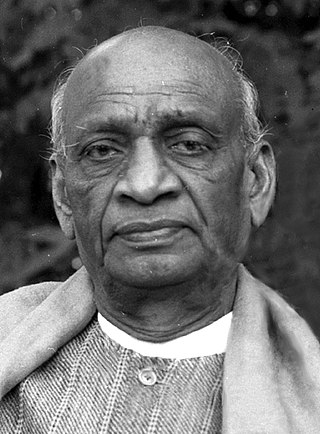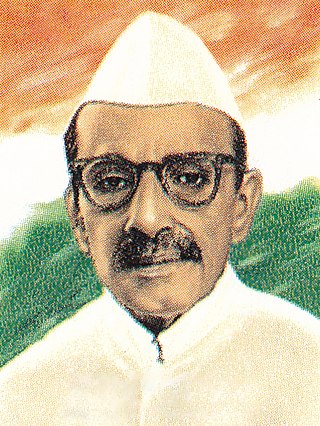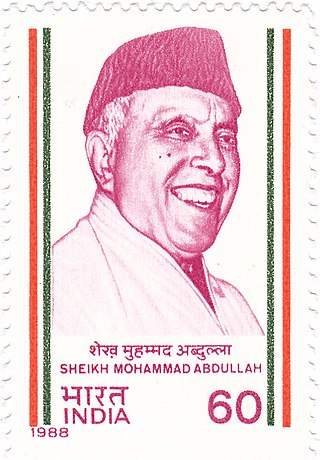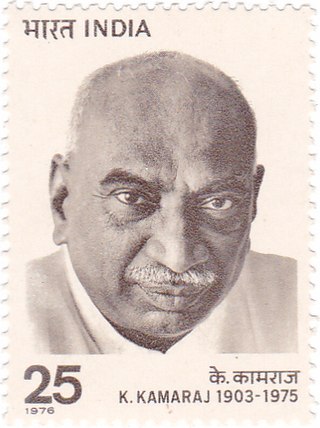
Jawaharlal Nehru was an Indian anti-colonial nationalist, secular humanist, social democrat, statesman and author who was a central figure in India during the middle of the 20th century. Nehru was a principal leader of the Indian nationalist movement in the 1930s and 1940s. Upon India's independence in 1947, he served as the country's prime minister for 16 years. Nehru promoted parliamentary democracy, secularism, and science and technology during the 1950s, powerfully influencing India's arc as a modern nation. In international affairs, he steered India clear of the two blocs of the Cold War. A well-regarded author, his books written in prison, such as Letters from a Father to His Daughter (1929), An Autobiography (1936) and The Discovery of India (1946), have been read around the world. The honorific Pandit has been commonly applied before his name.

Rajiv Gandhi was an Indian politician who served as the sixth prime minister of India from 1984 to 1989. He took office after the 1984 assassination of his mother, then Prime Minister Indira Gandhi, to become the youngest Indian Prime minister at the age of 40.

Vallabhbhai Jhaverbhai Patel, commonly known as Sardar, was an Indian lawyer, influential political leader, barrister and statesman who served as the first Deputy Prime Minister and Home Minister of India from 1947 to 1950. He was a barrister and a senior leader of the Indian National Congress, who played a leading role in the country's struggle for independence, guiding its integration into a united, independent nation. In India and elsewhere, he was often called Sardar, meaning "chief" in Hindi, Urdu, Bengali and Persian. He acted as the Home Minister during the political integration of India and the Indo-Pakistani War of 1947.

Lal Bahadur Shastri was an Indian politician and statesman who served as the 2nd Prime Minister of India from 1964 to 1966 and 6th Home Minister of India from 1961 to 1963. He promoted the White Revolution – a national campaign to increase the production and supply of milk – by supporting the Amul milk co-operative of Anand, Gujarat and creating the National Dairy Development Board. Underlining the need to boost India's food production, Shastri also promoted the Green Revolution in India in 1965. This led to an increase in food grain production, especially in the states of Punjab, Haryana and Uttar Pradesh.

The Indian National Congress (INC), colloquially the Congress Party but often simply the Congress, is a political party in India with widespread roots. Founded in 1885, it was the first modern nationalist movement to emerge in the British Empire in Asia and Africa. From the late 19th century, and especially after 1920, under the leadership of Mahatma Gandhi, the Congress became the principal leader of the Indian independence movement. The Congress led India to independence from the United Kingdom, and significantly influenced other anti-colonial nationalist movements in the British Empire.

Gulzarilal Nanda was an Indian politician and economist who specialized in labour issues. He was the Interim Prime Minister of India for two 13-day tenures following the deaths of Jawaharlal Nehru in 1964 and Lal Bahadur Shastri in 1966 respectively. Both his terms ended after the ruling Indian National Congress's parliamentary party elected a new prime minister. He was awarded the Bharat Ratna, India's highest civilian award, in 1997.

Motilal Nehru was an Indian lawyer, activist and politician belonging to the Indian National Congress. He also served as the Congress President twice, 1919–1920 and 1928–1929. He was a patriarch of the Nehru-Gandhi family and the father of Jawaharlal Nehru, the first Prime Minister of India.

"Tryst with Destiny" was an English-language speech delivered by Jawaharlal Nehru, the first Prime Minister of India, to the Indian Constituent Assembly in the Parliament House, on the eve of India's Independence, towards midnight on 14 August 1947. The speech spoke on the aspects that transcended Indian history. It is considered to be one of the greatest speeches of the 20th century and to be a landmark oration that captures the essence of the triumphant culmination of the Indian independence movement against British colonial rule in India.

Sheikh Mohammad Abdullah was an Indian politician who played a central role in the politics of Jammu and Kashmir Abdullah was the founding leader of the All Jammu and Kashmir Muslim Conference and the 1st elected Prime Minister of Jammu and Kashmir after its accession to India. He agitated against the rule of the Maharaja Hari Singh and urged self-rule for Kashmir. He served as the 1st elected Prime Minister of the Princely State of Jammu and Kashmir and was later jailed and exiled. He was dismissed from the position of Prime Ministership on 8 August 1953 and Bakshi Ghulam Mohammad was appointed as the new Prime Minister. The expressions 'Sadr-i-Riyasat' and 'Prime Minister' were replaced with the terms 'Governor' and 'Chief Minister' in 1965. Sheikh Abdullah again became the Chief Minister of the state following the 1974 Indira-Sheikh accord and remained in the top slot till his death on 8 September 1982.

Kamala Nehru was an Indian independence activist and the wife of Jawaharlal Nehru, the first Prime Minister of India. Her daughter Indira Gandhi was the first female Prime Minister of India.

Independence Day is celebrated annually on 15 August as a public holiday in India commemorating the nation's independence from the United Kingdom on 15 August 1947, the day when the provisions of the Indian Independence Act, which transferred legislative sovereignty to the Indian Constituent Assembly, came into effect. India retained King George VI as head of state until its transition to a republic, when the Constitution of India came into effect on 26 January 1950 and replaced the dominion prefix, Dominion of India, with the enactment of the sovereign law Constitution of India. India attained independence following the independence movement noted for largely non-violent resistance and civil disobedience.
A Cabinet Mission came to India in 1946 in order to discuss the transfer of power from the British government to the Indian political leadership, with the aim of preserving India's unity and granting its independence. Formed at the initiative of Clement Attlee, the mission contained as its members, Lord Pethick-Lawrence, Sir Stafford Cripps, and A.V. Alexander. The Viceroy of India Lord Wavell participated in some of the discussions.

Kumaraswami Kamaraj, popularly known as Kamarajar was an Indian independence activist and politician who served as the Chief Minister of Madras State from 13 April 1954 to 2 October 1963. He was the founder and the president of the Indian National Congress (Organisation), widely acknowledged as the "Kingmaker" in Indian politics during the 1960s. He also served as the president of the Indian National Congress for two terms i.e. four years between 1964–1967 and was responsible for the elevation of Lal Bahadur Shastri to the position of Prime Minister of India after Nehru's death and Indira Gandhi after Shastri's death. He was the Member of Parliament, Lok Sabha during 1952–1954 and 1969–1975. He was known for his simplicity and integrity. He played a major role in developing the infrastructure of the Madras state and worked to improve the quality of life of the needy and the disadvantaged.

Ezra Mir was an Indian film-maker, known for his documentary films.

Swami Vivekananda, the nineteenth-century Indian Hindu monk, is considered one of the most influential people of modern India and Hinduism. Rabindranath Tagore suggested to study Vivekananda's works to learn about India. Indian independence activist Subhas Chandra Bose regarded Vivekananda as his spiritual teacher. Mahatma Gandhi said that after reading the works of Vivekananda, his love for his nation became a thousand-fold.

The Jinnah–Mountbatten Talks were bilateral talks held in Lahore between the Governor-Generals Muhammad Ali Jinnah and Louis Mountbatten of Pakistan and India, to address the Kashmir dispute. The talks were held on 1 November 1947, five days after India dispatched its troops to defend the princely state of Kashmir(which was a Muslim majority state recently acceded to India) against a tribal invasion. In the talks, Mountbatten presented India's offer to hold an impartial plebiscite under the United Nations auspices to decide the accession of Kashmir. Jinnah effectively rejected the offer.
On 27 December 1963, Moi-e-Muqqadas, a holy relic believed by many to be a strand from the beard of prophet Muhammad, went missing the Hazratbal Shrine in Jammu and Kashmir, leading to widespread protests across the Indian subcontinent.
Nehru is a 1984 Indian english language documentary film based on the life of Jawaharlal Nehru, the first Prime Minister of independent Republic of India. The film is directed by Shyam Benegal and Yuri Aldokhin, and produced by Films Division of India in collaboration with Center-Nauch-Film Studios, and Sovin Films, Russia with Yash Chaudhary as the executive producer. The film won the inaugural Best Historical Reconstruction and Compilation Film at the 32nd National Film Awards.
Our Prime Minister is a 1957 Indian English language short biographical documentary film based on the life of Pandit Jawaharlal Nehru, the first Prime Minister of independent Republic of India. The film was produced, compiled and directed by Ezra Mir.














